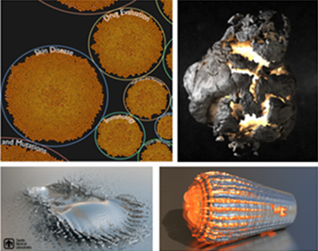Our complex systems groups develop underlying computer science and mathematical techniques needed to solve national problems related to large, complex systems. Our core research focuses on advanced methods in computer science, operations research, system dynamics, and discrete mathematics.
Data and Decision Sciences

Sandia and the CCR support decision-makers in multiple national security application domains including cyber security, non-proliferation, counterterrorism, and battlefield situational awareness. The decision sciences research is multidisciplinary and blurs the line between computing and humans. This group has extensive experience in a number of computational fields such as discrete math, graph analytics, statistics, machine learning, and visualization, as well as the cognition and cognitive neuroscience that is required to explore and understand human decision-making and cognition.
Focus Areas
We develop advanced algorithms and modeling tools for a variety of optimization research areas, including engineering design, parameter estimation, inverse modeling, logistics and planning, and design of complex systems. Our research considers a wide range of optimization problems, including integer and linear programming, disjunctive programming, stochastic programming, surrogate-based optimization and PDE-constrained optimization. We implement these algorithms in our software tools, including DAKOTA (http://dakota.sandia.gov), Trilinos (https://trilinos.github.io/) and Coopr (https://software.sandia.gov/coopr), which are distributed as open source software.
Through open source projects, we collaborate on innovations in tool development, component development, and scalable algorithm research with partners and customers around the world. Our current software projects focus on machine learning, graph algorithms, cognitive modeling, text analysis, visualization, systems dynamics, and operations research.
The data analysis and visualization groups focus on scalable techniques for providing decision support in national security and national-level challenges. By incorporating advanced algorithms, innovative hardware architectures, and scalable analysis components, we develop solutions that promote insight, regardless of the complexity, size, or uncertainty of the data. With a focus on machine learning, graph algorithms, text analysis, Bayesian modeling, and tensor factorizations, our groups provide state-of-the-art capabilities for critical data modeling and analysis applications.
In addressing critical problems in national security, the Cognitive Science and Applications groups provide solutions that include both technology and human cognition aspects. The main focus of these efforts include understanding human decision making, improving human performance, human-centric data collection and analysis, advanced software development, and surety-based verification and validation, ethics, legal, and social issues.